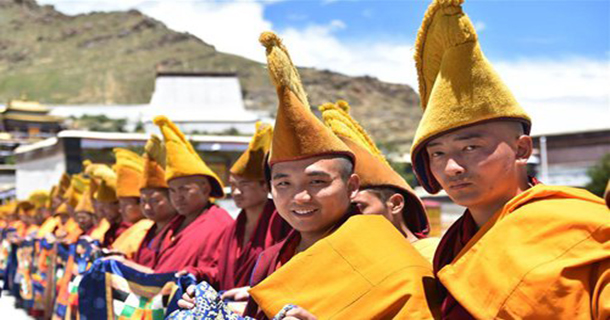
Photo: Xinhua/Chogo
The Reciprocal Access to Tibet Act, which was signed into American Law by its President Donald Trump in December, has prompted an angry reaction from China and possibly contributed to the escalating tensions between the two countries.
The new law means that Chinese officials who deny US journalists, diplomats and citizens access to Tibet will find themselves denied access to the US. China’s reaction to this new law was reported by Reuters who said in an article, “China denounced the United States […] for passing a new law on restive Tibet, saying it was ‘resolutely opposed’ to the US legislation on what China considers an internal affair, and it risked causing ‘serious harm’ to their relations.” The article continued, “Chinese foreign ministry spokeswoman Hua Chunying told a daily briefing that the law ‘sent seriously wrong signals to Tibetan separatist elements’, as well as threatening to worsen bilateral ties strained by trade tension and other issues. If the United States implements this law, it will cause serious harm to China-US relations and to the cooperation in important areas between the two countries.”
China has followed this response by targeting His Holiness the Dalai Lama in a series of articles in their state media, published in English to reach an international audience, one example being the Global Times which said “Tibet authorities lambast Dalai Lama in series of articles as US passes Tibet Reciprocal Access bill” – this apparently refers to a number of editorials in Chinese news outlets blaming His Holiness for the self-immolations that have taken place in Tibet since 2009 and for the protests there in 2008.Editorials in the Tibet Daily described the Dalai Lama as “prime leader of separatist political groups pursuing ‘Tibet independence,’ the loyal tool of international anti-China forces, the root cause of social unrest in Tibet, the biggest obstacle for Tibetan Buddhism to establish normal order and a politician under the disguise of religion.”
Meanwhile the China Daily has quoted a Chinese government official in Lhasa saying, “The Tibet autonomous region plans to cut the time for issuing travel permits to overseas tourists by half in 2019”. Currently the process is slow and many are refused entry; those who do gain access have to travel on officially controlled tours.
This comes at a time of escalating tensions between the United States and China with the US issuing warnings to Americans to “exercise increased caution” when travelling to China. Their government website travel advises travellers to“Exercise increased caution in China due to arbitrary enforcement of local laws as well as special restrictions on dual US-Chinese nationals.Chinese authorities have asserted broad authority to prohibit US citizens from leaving China by using ‘exit bans,’ sometimes keeping US citizens in China for years[…] In most cases, US citizens only become aware of the exit ban when they attempt to depart China, and there is no method to find out how long the ban may continue. US citizens under exit bans have been harassed and threatened.”
These warnings follow some recent detentions:Chinese tech giant Huawei’s CEO Meng Wanzhou was arrested in Canada and faces extradition to the US. China retaliated by detaining 13 Canadians in China. Other US citizens have been detained in China over the last year.




 Print
Print Email
Email